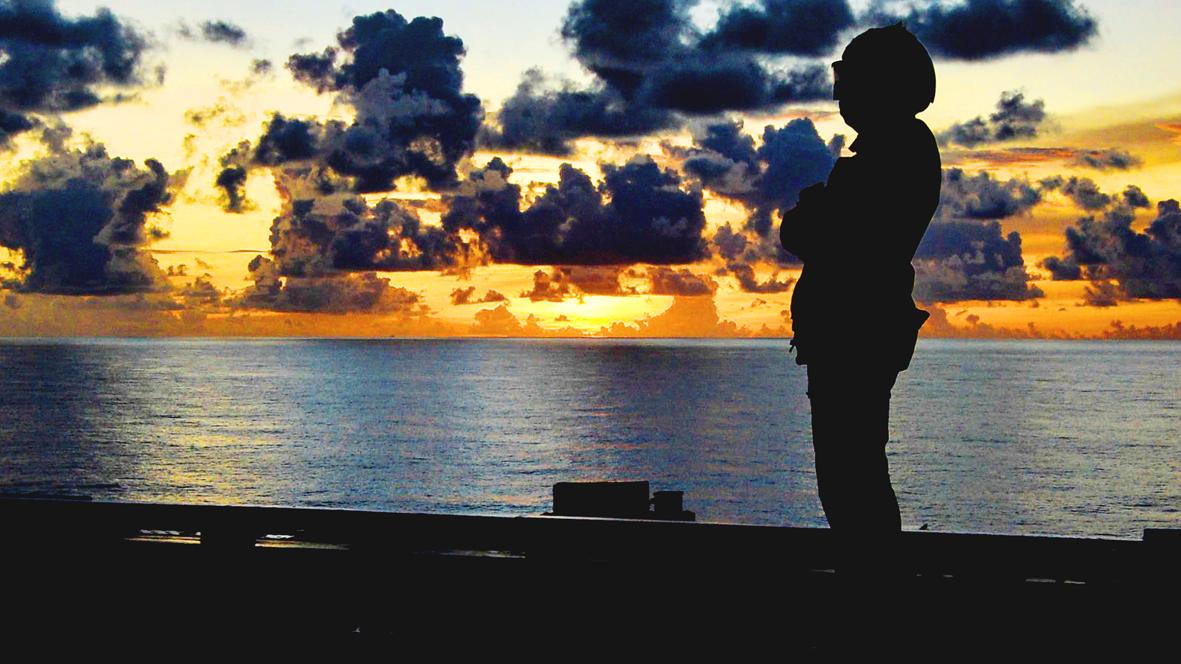Australia has rejected Beijing’s territorial and maritime claims in the South China Sea in a formal declaration to the UN.
In a statement filed on Thursday, Australia said there was “no legal basis” to several disputed Chinese claims in the sea, including those related to the construction of artificial islands on small shoals and reefs.
“Australia rejects China’s claim to ‘historic rights’ or ‘maritime rights and interests’ as established in the ‘long course of historical practice’ in the South China Sea,” the declaration read.

Photo: Reuters
“There is no legal basis for China to draw straight baselines connecting the outermost points of maritime features or ‘island groups’ in the South China Sea, including around the ‘Four Sha’ or ‘continental’ or ‘outlying’ archipelagos,” it read.
“Four sha,” or four sands (四沙), refers to Beijing’s claim over the Pratas Islands (Dongsha Islands, 東沙群島), the Paracels (Xisha Islands, 西沙群島), the Spratlys (Nansha Islands, 南沙群島), and an island group that includes Macclesfield Bank (Zhongsha Islands, 中沙群島), all of which are also claimed by Taiwan.
The declaration came after US Secretary of State Mike Pompeo declared Beijing’s pursuit of territory and resources in the South China Sea to be illegal, explicitly backing the territorial claims of Southeast Asian countries against China’s.
Beijing claims almost all of the South China Sea based on a so-called “nine-dash line,” a vague delineation from maps dating back to the 1940s.
The latest escalation comes ahead of annual talks between Australia and the US, with Australian ministers to travel to Washington for the first time since Canberra closed the nation’s borders amid the COVID-19 pandemic.
The meetings come at a “critical time” and it is essential that they are held face-to-face, Australian Minister of Foreign Affairs Marise Payne and Australian Minister of Defence Linda Reynolds said in a statement yesterday.
Payne and Reynolds also penned an article in the Australian newspaper, labeling national security legislation that Beijing imposed on Hong Kong last month as “sweeping and vague.”
“We face a public health crisis, economic upheaval and resurgent authoritarian regimes using coercion in a bid to gain power and influence at the expense of our freedoms and sovereignty,” they wrote.
Additional reporting by staff writer

INVESTIGATION: The case is the latest instance of a DPP figure being implicated in an espionage network accused of allegedly leaking information to Chinese intelligence Democratic Progressive Party (DPP) member Ho Jen-chieh (何仁傑) was detained and held incommunicado yesterday on suspicion of spying for China during his tenure as assistant to then-minister of foreign affairs Joseph Wu (吳釗燮). The Taipei District Prosecutors’ Office said Ho was implicated during its investigation into alleged spying activities by former Presidential Office consultant Wu Shang-yu (吳尚雨). Prosecutors said there is reason to believe Ho breached the National Security Act (國家安全法) by leaking classified Ministry of Foreign Affairs information to Chinese intelligence. Following interrogation, prosecutors petitioned the Taipei District Court to detain Ho, citing concerns over potential collusion or tampering of evidence. The

NEGOTIATIONS: Taiwan has good relations with Washington and the outlook for the negotiations looks promising, Minister of Economic Affairs J.W. Kuo said Taiwan’s GDP growth this year is expected to decrease by 0.43 to 1.61 percentage points due to the effects of US tariffs, National Development Council (NDC) Minister Paul Liu (劉鏡清) said at a meeting of the legislature’s Economics Committee in Taipei yesterday, citing a preliminary estimate by a private research institution. Taiwan’s economy would be significantly affected by the 32 percent “reciprocal” tariffs slapped by the US, which took effect yesterday, Liu said, adding that GDP growth could fall below 3 percent and potentially even dip below 2 percent to 1.53 percent this year. The council has commissioned another institution

TRADE: The premier pledged safeguards on ‘Made in Taiwan’ labeling, anti-dumping measures and stricter export controls to strengthen its position in trade talks Products labeled “made in Taiwan” must be genuinely made in Taiwan, Premier Cho Jung-tai (卓榮泰) said yesterday, vowing to enforce strict safeguards against “origin laundering” and initiate anti-dumping investigations to prevent China dumping its products in Taiwan. Cho made the remarks in a discussion session with representatives from industries in Kaohsiung. In response to the US government’s recent announcement of “reciprocal” tariffs on its trading partners, President William Lai (賴清德) and Cho last week began a series of consultations with industry leaders nationwide to gather feedback and address concerns. Taiwanese and US officials held a videoconference on Friday evening to discuss the

NEGOTIATIONS: The US response to the countermeasures and plans Taiwan presented has been positive, including boosting procurement and investment, the president said Taiwan is included in the first group for trade negotiations with the US, President William Lai (賴清德) said yesterday, as he seeks to shield Taiwanese exporters from a 32 percent tariff. In Washington, US Trade Representative Jamieson Greer said in an interview on Fox News on Thursday that he would speak to his Taiwanese and Israeli counterparts yesterday about tariffs after holding a long discussion with the Vietnamese earlier. US President Donald Trump on Wednesday postponed punishing levies on multiple trade partners, including Taiwan, for three months after trillions of US dollars were wiped off global markets. He has maintained a 10 percent